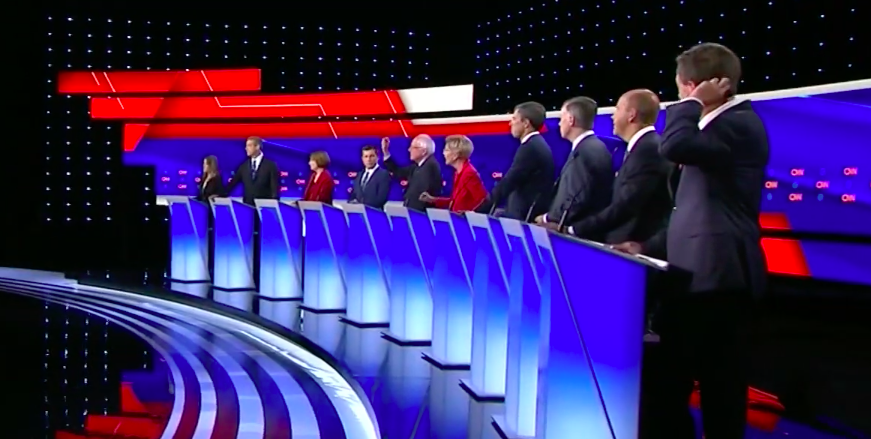Second Democratic debate kicks off with ideological showdown
Ten Democratic candidates will share the stage for the third Democratic presidential primary debate Thursday.
July 30, 2019
The first night of the second Democratic presidential debate featured a matchup of moderates versus progressives.
There had been expectations among pundits that Sen. Elizabeth Warren and Sen. Bernie Sanders, the two most outspoken progressive candidates on stage Tuesday, would attack each other in an attempt to consolidate left-wing support.
Such a head-to-head clash failed to materialize. Instead, the two progressives occasionally teamed up to fend off pointed remarks from some of the more moderate candidates, especially former Rep. John Delaney.
Iowa State College Democrats Co-President Sehba Faheem said the debate made her think several candidates need to drop out of the race.
“They’re not adding to the debate,” Faheem said.
Warren and Sanders spoke more than any other candidates, speaking more than 18 and 17 minutes respectively, as they responded to attacks on them from the more moderate candidates they shared the stage with.
Delaney said voters have a choice whether to “go down the road” Sanders and Warren call for, such as implementing “Medicare for All,” and tuition-free college. He added those policies would “turn off independent voters,” and lead to President Donald Trump’s re-election.
“Or, we can nominate someone with new ideas to create universal health care for every American, with choice,” Delaney said.
Sanders responded, saying Delaney was wrong, adding he believed health care is a right, not a privilege, and he will fight for it.
Delaney shot back at Sanders, saying they don’t need to be telling people their health insurance would become illegal.
Warren jumped to Sanders’s defense, saying Democrats aren’t trying to take away health care from people.
“[W]e should stop using Republican talking points in order to talk with each other about how to best provide that health care,” Warren said.
One of the debate’s moderators, Jake Tapper, said Warren calls herself a capitalist, and Sanders calls himself a socialist. Tapper asked Warren whether she is trying to make voters think she is a safer choice than Sanders in that manner.
Warren declined to use the opportunity to distinguish herself from Sanders, and said voters should not be scared to support a candidate because their policies are bold.
Faheem said she felt the moderators were asking divisive questions of the candidates in an attempt to create a spectacle for higher ratings.
Montana Gov. Steve Bullock called Warren and Sanders’s proposals “wish-list economics,” adding universal health care coverage could be achieved by a public option, after Warren had said middle class family spending on health care would not go up under her plans.
Sanders argued union members would have better healthcare under his Medicare for All plan than under their current private, union-negotiated health insurance plans. He said it would finally include for senior citizens “dental care, hearing aids and eyeglasses.”
Rep. Tim Ryan interrupted Sanders to say Sanders did not know that for sure coverage would be better.
“I do know, I wrote the damn bill,” Sanders responded.
Not easily fitting into the progressive versus moderate dynamic on stage, author Marianne Williamson supported some left-wing policies, reiterating her support for financial reparations for descendants of slaves.
In contrast, former Rep. Beto O’Rourke said as president he would sign a bill proposed by Rep. Sheila Jackson Lee, D-Texas, to examine the consequences of slavery and study the possibility of reparations for descendants of slaves.
Williamson also said she is concerned about what Republicans would say about the party’s move towards Medicare for All health care plans eliminating private health insurance.
South Bend Mayor Pete Buttigieg said that it is time for Democrats to stop worrying about what Republicans say about their policy plans, adding Republicans would call them socialists whether they support left-wing policies or conservative policies.
In another Warren versus Delaney moment, Don Lemon, one of the moderators, pointed out Delaney’s net worth is high enough to be subjected to Warren’s wealth tax. Delaney was asked whether he agrees Warren’s wealth tax plan is a “fair way” to fund child care and education.
“I think wealthy Americans have to pay more,” Delaney said. “But we have to have a real solution, the real solution is to raise the capital gains rates … I think the wealth tax will be fought in court forever — it’s arguably unconstitutional.”
Warren responded by saying it is time to tax the wealthiest Americans.
“It’s time to tax the top one-tenth of 1% of fortunes in this country. Your first $50 million you can keep free and clear, but your fifty millionth and first dollar you have got to pitch in 2 cents” Warren said. “What can America do with 2 cents? We can provide universal child care for every baby care in this country age zero to five, we can provide universal pre-K for every three year old and four year old.”
Warren listed several other progressive proposals her wealth tax would pay for, including higher wages, universal tuition-free college and money for historically black colleges and universities.
In post-debate messaging, Warren has rehashed the progressive versus moderate clashes from the debate, tweeting “We can’t choose a candidate we don’t believe in just because we’re too scared to do anything else. And we can’t ask others to vote for a candidate we don’t believe in.”

















